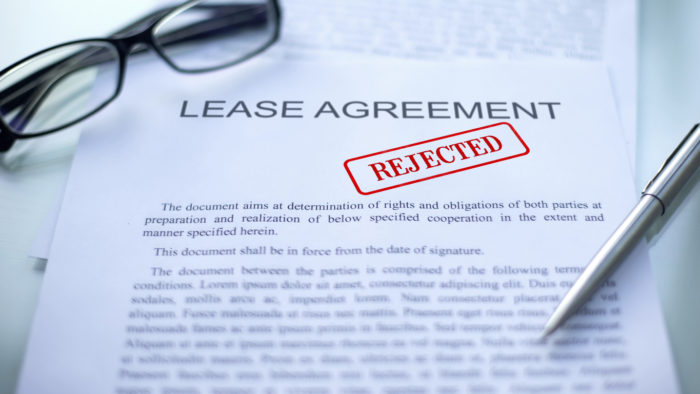Tenants and Bankruptcy: Consequences on Unexpired Leases
August 26th, 2019 | By: Robin R. Mocabee, Esq.
Bankruptcy, in general, can often be confusing and misunderstood. This is especially true for landlords because bankruptcy cases frequently involve the interplay between federal and state laws.
Under state law, a lease agreement is a contract and when one party fails to honor its terms, the party is in default or breach. For instance, this occurs when tenants fail to pay rent, allowing landlords to avail themselves of certain legal remedies.
However, when tenants file bankruptcy, landlords cannot enforce their state court rights until the bankruptcy is addressed in federal court. Bankruptcy law gives tenants rights and protections not otherwise available to them. The most well-known is the automatic stay (see our blog Tenants and Bankruptcy: Lifting the Stay). Another involves the tenants’ right to assume or reject an unexpired lease. When tenants “assume” the lease, it means they will continue with the original terms, and they may do this even if they are in default, subject to certain conditions.
When tenants “reject” the unexpired lease, it means they want to be excused from its obligations and they are expected to vacate the premises. Rejection is not synonymous with termination of the lease itself. Landlords may not simply conclude that the lease has prematurely expired and that a holdover tenancy has been created. In other words, although the tenants have expressed a desire to be released from the lease obligation, it is still incumbent on landlords to formally terminate the lease and obtain possession. Otherwise, landlords could be in violation of the bankruptcy stay. This legal concept has recently been explored in a case before the Bankruptcy Appellate Panel of the Sixth Circuit.
In that case[1], the tenants filed a Chapter 7 bankruptcy with nine months remaining on their lease for a property in Cleveland, Ohio. Already behind in their rent at the time they filed, the tenants stated an intention to reject the unexpired lease. The Chapter 7 trustee took no action and the lease was deemed rejected as a matter of law. Despite this, the tenants continued to occupy the premises for six more months without paying any rent to the landlord.
During this time, the landlord attempted to collect rent. However, the bankruptcy court determined that the landlord’s actions were a willful violation of the automatic stay and thus awarded damages to the tenants in excess of $1,600. Instead of paying the damages, the landlord applied a credit toward the rental arrearage, arguing that the tenants were liable for any post-rejection rent due to the creation of a holdover tenancy under Ohio law. The tenants disagreed and the bankruptcy court ultimately determined that any rent owed to the landlord, including rent for the six month period following the rejection, was uncollectible.[2]
On appeal[3], the panel relied upon a separate recent U.S. Supreme Court decision[4], which reasoned that rejection of an unexpired lease constitutes a breach of the lease. The panel did not agree with the landlord’s holdover argument and concluded that rejection did not automatically result in the termination of an unexpired lease under Ohio law. It did, however, recognize that the rejection amounted to a breach of contract, for which the landlord could pursue its available state law remedies after obtaining relief from the automatic bankruptcy stay.
The Bottom Line: Landlords with tenants in bankruptcy, especially a Chapter 7, may not unilaterally declare a holdover tenancy based on rejection of the unexpired lease agreement. They can, however, treat the rejection as a breach, seek relief from the bankruptcy stay, and then enforce their state court rights to obtain possession of the rental premises.
[1] In re Roberson, 2016 Bankr. LEXIS 3944.
[2] The court determined this to be pre-petition debt and subject to discharge. See our blog Tenants and Bankruptcy: The Basics.
[3] In re Roberson, 2019 U.S. App. LEXIS 16120, 67 Bankr. Ct. Dec. 72.
[4] Mission Prod. Holdings v. Tempnology, LLC, 139 S. Ct. 1652, 203 L. Ed. 2d 876, 2019 U.S. LEXIS 3544, Bankr. L. Rep. (CCH) P83,378, 67 Bankr. Ct. Dec. 51, 27 Fla. L. Weekly Fed. S 813, 2019 WL 2166392.
The information contained in this article is only meant to be a basic overview and should not be construed as legal advice. Readers should not act upon this information without the advice of an attorney. The contents are intended for general information purposes only and may not be quoted or referred to in any other publication or otherwise be disseminated without the prior written consent of Paletz Law.
Speak with a Paletz Landlord
Advocate Today
 - advice for small to mid-size businesses to help them better their day-to-day operations
- advice for small to mid-size businesses to help them better their day-to-day operations 